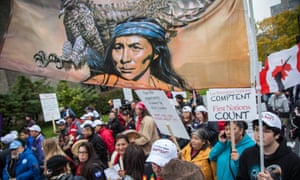
At just 43, Justin Trudeau has become the new prime minister of Canada.
A humble family man who seeks to build on the legacy of his father, Pierre
Trudeau, the Liberal party leader has won not only a surprise majority, but
also the support of the country’s most overlooked demographic – the indigenous
community. Comprising roughly 1.4 million people, the First Nations tilted the
vote in favour of the youthful Trudeau, who declared that he sought to “renew
the nation-to-nation” conversation between aboriginal Canada and the rest of
its peoples.
Canadian election: opposition parties urge new ties with aboriginal
people
Now that Trudeau has decided to address Canada’s indigenous community,
attention is drawn to its fraught colonial history, and the new leader’s quest
to make the biggest scheme of reparations to aboriginal people in Canada’s
history.
Understandably, large parts of the community are sceptical of his
proposals. The former prime minister, Stephen Harper, took a hard line in
comparison to the progressive Liberals, and his refusal to deal with indigenous
human rights issues has further damaged the relationship between the government
and the community. When it was revealed that nearly 1,200 women had gone missing
or been murdered in the indigenous community in the past 30 years, Trudeau
pledged to launch an “immediate” inquiry, which will be essential in gaining
the trust of the Native community.
While the New Democratic party declared that it would press for the
inquiry to take place within the first 100 days of government, Trudeau’s party
is already flailing with the figures. Jody Wilson-Raybould, a Liberal party MP
and aboriginal woman, said: “I’m not going to speculate on how soon, but we did
use the word ‘immediately’ [in the campaign].” It is this line between emotive
rhetoric and precise strategy that could lead the Trudeau administration into
trouble.
Half of indigenous children live below the poverty line as a result of
the horrors of the reservations
Although that sense of distrust might seem odd to the most sceptical of
political bystanders, it is understandable why some aboriginal people might not
be willing to trust the first white man willing to make a promise. Trudeau has
unveiled plans to spend $2.6bn (£1.3bn) on improving the poor state of
indigenous education, but critics are unsure where this money is coming from –
the previous Liberal government insisted on a 2% cap on aboriginal education
spending. And Trudeau must tackle the root causes of educational inequality
rather than just throwing money at the problem. As late at 1996, indigenous
children were forced to attend residential schools, Canadian government
boarding facilities in which they were frequently beaten, tortured and raped.
To this day, roughly half of aboriginal people complete secondary school
education, with half of indigenous children living below the poverty line.
Trudeau needs to get the basics right before he can gain pace on issues
of social equality, and it appears that the basics will take a long time. Two
thirds of all indigenous water in Canada has been under an arcane “boil water
advisory” at some point since 2004, with 400 out of 618 First Nations
communities without a secure supply of drinking water. The reserve community
Shoal Lake 40 has its drinking water shipped in on a faulty barge, and has not
been given the funds to build a road that would allow it to create a
desperately needed water treatment plant. In a pledge to eliminate boil water
advisories over the next five years, Trudeau declared that they were “not right
in a country like Canada”.
Trudeau has inherited far more than his father’s legacy as the next
leader of Canada. Left to rectify a history of indigenous distrust, he must act
swiftly and efficiently on his promises to unify aboriginal Canada and the rest
of its people. Although money doesn’t appear to be a problem when it comes to
Trudeau’s plans and commitments for the community, an overhaul of the root
causes of these horrendous issues of social equality needs to be made in order
to ensure that the leader is listening to his people in the nation-to-nation
conversation, rather than being a one-way barrage of idealistic, well-versed
Trudeautopia.
Jasmine Andersson

No comments:
Post a Comment